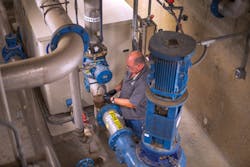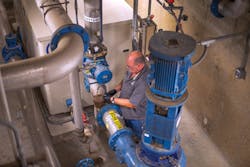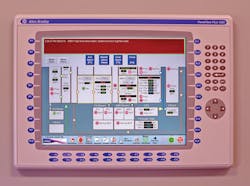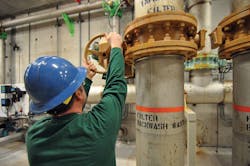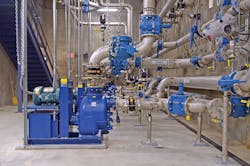By Paul Roux
With their community’s health and safety on the line, water and wastewater managers have always handled an enormous amount of responsibility. Yet today, new internet communication systems and a more transient workforce are changing the role and expectations of managers across the country and it is time to recognize, support, and compensate managers for these changes.
What is changing?
Water and wastewater utilities are losing support at a local level. This is because town officials are, on average, changing jobs more frequently than they have in the past. Town officials used to stay in the same area for most of their careers, which allowed managers to develop close relationships with them. If the water and wastewater managers were providing consistent and reliable service, the town officials would support and leverage calls for additional funding for necessary upgrades and repairs. Today, system managers have to continually justify and quantify the value of their operations as staffing turnovers increase and utility and chemical costs skyrocket.
This trend is especially troubling given that America’s water infrastructure is already massively underfunded. The American Society of Civil Engineers has given the nation’s infrastructure a D grade and the Environmental Protection Agency (EPA) has estimated that an investment of $4.8 trillion over the next 20 years is necessary to properly update water and wastewater system assets.
The revolving door of town officials is not the only personnel challenge facing plant managers; there is also a lack of skilled public works employees inside their own operations and throughout the entire workforce. Many utilities are faced with a looming retirement wave and are unable to comply with their regulatory required staffing levels, let alone find personnel with the advanced technological skillset their utilities need. Managers are left with meager budgets and employees who struggle to learn new treatment technologies. In some states, this issue is compounded even more by the steep qualifications needed to operate treatment facilities and conveyance systems. As plants become more advanced and install more technology, the need for qualified, highly skilled licensed operators will increase.
In addition, utility managers are being forced to integrate new technologies into their operations that go beyond a system’s original design capabilities in order to meet compliance under tight budget restraints. For example, the way managers are expected to manage their staff is changing due to technological advances. Utility managers are required to become skilled in advanced management software to manage everything from human resources data to internal communications. Often, younger staff have had more exposure to these types of systems than their supervisors, which can create tense work environments if managers are unable to get up to speed.
Additionally, while social media have provided utilities with new avenues to communicate with their customers, this shift in information-sharing is changing how frequently managers are expected to engage with the public. Previously, managers would make an effort to inform their customers about major announcements through local flyers or the newspaper. Today, utilities are expected to constantly inform their customers about even small upgrades or service outages. Often, these updates can complicate projects when information is not interpreted properly - creating a whole new stream of work for utility managers and town leaders.
Although these technological advances expedite communications and interaction with the public and optimize workflow, it is a stressful and time-intensive process for many seasoned or veteran utility managers to learn these new systems and processes.
How can the industry adapt?
While the odds may be stacked against them, there are ways managers can thrive in their new roles. There is no getting around the need to pursue funding and training, and by investing in systems and employees today, utilities will save money and time down the line.
Attributes of a Successful Manager
Investing in technology and training empowers managers to be skilled and flexible in all aspects of their expanded role. Today’s managers must have accounting skills and be able to develop detailed operating and capital budgets and complex capital improvements plans. Managers must also have advanced technology skills in order to stay current with, and possibly ahead of, advances in an industry where advances happen every day. Finally, managers need to be adept in communications - able to deliver consistent and clear internal communications, maintain a social media outreach plan, and actively pursue funding opportunities. The sheer amount and diversity of skills managers need in order to succeed are intimidating to non-industry professionals, and all of these skills need to be nurtured and appreciated.
Strategies to Retain Successful Managers
To retain skilled plant managers, all staff must be encouraged and compensated to keep up with certification and training. By putting professional development at the core of their business model, utilities can ensure that their employees are able to keep up with the increasing demands and remain engaged and productive. To attract future talent, a concerted effort is needed to match wages to similar positions in the area and establish internship and mentoring programs. While these require upfront investments, they will help retain the talent needed to keep facilities compliant now and into the future. Every day, utilities are losing their managers to neighboring communities or private industry over lack of funding for training and professional growth.
Tactics to Fiscally Support Successful Managers
But where does this upfront investment come from? In addition to keeping local stakeholders educated and engaged about their facility and services, it is crucial for plant managers to be well educated about the grants and funding opportunities available to them. Loans like State Revolving Funds can be a great resource for facility upgrades - especially when projects are designed to pay off over time.
For example, while investments in new technology can be burdensome at first, when implemented correctly, tools such as supervisory control and data acquisition (SCADA) systems, computerized maintenance and management systems (CMMS) and geographic information systems (GIS) can save utilities money in the long run. Woodard & Curran worked with a small utility that was having a hard time filling staffing needs. By investing $30,000 in SCADA system upgrades and repairs, they were able to reduce staff hours, enable remote operations, and in the end, save over $70,000 a year in staffing costs. Since the SCADA project completion, the utility has saved over $300,000, making its return to date 10 times the investment.
As the role of the plant manager continues to change, the water and wastewater industries need to be ready to adapt. By recognizing and rewarding managers for their growing responsibilities, municipalities can create an environment where these unsung heroes are supported and appreciated.
About the Author: Paul Roux is a senior principal and operations leader for Woodard & Curran’s Operations & Management business, responsible for operational/business decisions for water and wastewater systems that Woodard & Curran contract-operates nationwide. Contact him at [email protected] or visit the firm’s website at woodardcurran.com.
